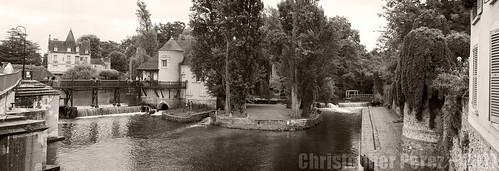Coming from America where nearly everyone of legal age has their license, we're sometimes taken aback to learn how many people don't drive and don't own a car. We are sometimes surprised by the number of Parisiennes who do not have a driver's license. Normally there is no need for a license as public transportation in Europe is fantastic and a person can easily get around without resorting to driving an automobile.
One day over lunch a friend shared an interesting story of why she has her driver's license.
After the second world war Sylvie's father absolutely insisted she learn how to drive. By her account her father was a domineering man and never took no for an answer. Without question she submitted to her father's will and went through the process of learning how to drive.
The story actually begins at the outset of the war. On May 10, 1940, the German Army started its invasion of France. The heavily fortified Maginot Line was France's primary defense. There was, however, a gap between the north end of the Maginot Line and the sea. The allies felt prepared and plans to defend the gap were put into action.
In only one location were the French and English defenses somewhat weak. That was in the Ardennes forest. It is a rugged area and the allies felt the Germans would have a tough time getting through. Yet, that's exactly where the Germans succeeded. By June 14 Paris had fallen to the Nazis and the occupation of France had begun.
Sylvie's father was French, but he spoke German and Czech fluently. He'd been captured by the Germans and spent the duration of the war in prison. It was in prison where he picked up the additional language skills.
Years later her father had a story to tell that related to his insistence that she learn how to operate an automobile.
When the Germans swept around the north end of the Maginot Line they pinned the French Army against the inside their own line of defense. Trapped against their own wall many French were killed. Somehow Sylvie's father escaped that fate. The company her father was attached to knew the Germans were coming and naturally tried make their way to freedom.
There were two jeeps in the company and they should have been pressed into immediate use. There was one small problem. Not one single person in the entire company knew how start the jeeps. Neither did anyone in the company kn0w how to drive. So there they sat, unable to move, waiting for the Germans to arrive and kill them.
For whatever reason the Germans, instead, captured the trapped unit and sent them to prison.
Sylvie's father vowed he would never be be unable to escape danger in this way ever again. After the war he learned to drive. And to give his family the best opportunity to escape if needed he insisted that Sylvie, too, learn now to drive.

One day over lunch a friend shared an interesting story of why she has her driver's license.
After the second world war Sylvie's father absolutely insisted she learn how to drive. By her account her father was a domineering man and never took no for an answer. Without question she submitted to her father's will and went through the process of learning how to drive.
The story actually begins at the outset of the war. On May 10, 1940, the German Army started its invasion of France. The heavily fortified Maginot Line was France's primary defense. There was, however, a gap between the north end of the Maginot Line and the sea. The allies felt prepared and plans to defend the gap were put into action.
In only one location were the French and English defenses somewhat weak. That was in the Ardennes forest. It is a rugged area and the allies felt the Germans would have a tough time getting through. Yet, that's exactly where the Germans succeeded. By June 14 Paris had fallen to the Nazis and the occupation of France had begun.
Sylvie's father was French, but he spoke German and Czech fluently. He'd been captured by the Germans and spent the duration of the war in prison. It was in prison where he picked up the additional language skills.
Years later her father had a story to tell that related to his insistence that she learn how to operate an automobile.
When the Germans swept around the north end of the Maginot Line they pinned the French Army against the inside their own line of defense. Trapped against their own wall many French were killed. Somehow Sylvie's father escaped that fate. The company her father was attached to knew the Germans were coming and naturally tried make their way to freedom.
There were two jeeps in the company and they should have been pressed into immediate use. There was one small problem. Not one single person in the entire company knew how start the jeeps. Neither did anyone in the company kn0w how to drive. So there they sat, unable to move, waiting for the Germans to arrive and kill them.
For whatever reason the Germans, instead, captured the trapped unit and sent them to prison.
Sylvie's father vowed he would never be be unable to escape danger in this way ever again. After the war he learned to drive. And to give his family the best opportunity to escape if needed he insisted that Sylvie, too, learn now to drive.

